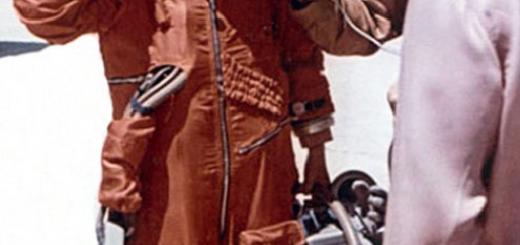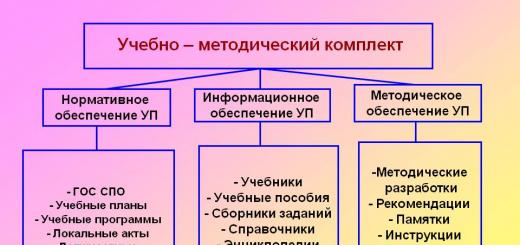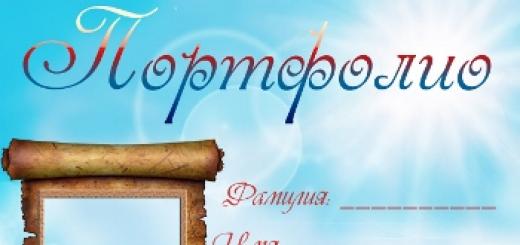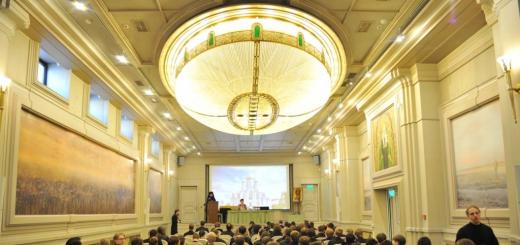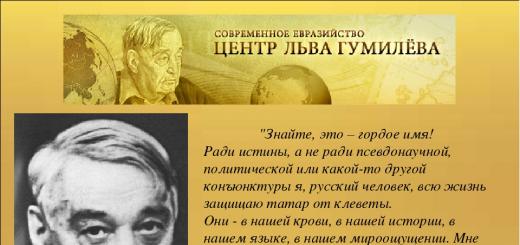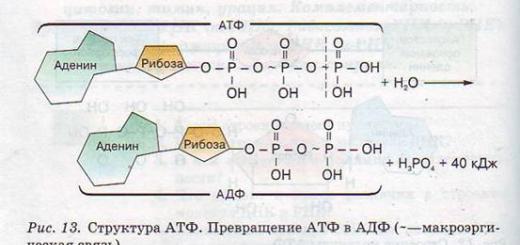Marina Tsvetaeva is a very extraordinary Russian poet, whose work is distinguished by expressiveness and emotionality. All her poems show a love of truth and freedom - in this Tsvetaeva is in many ways reminiscent of Alexander Blok, whose influence can be seen in many of her works.
Tsvetaeva and Blok did not know each other personally, but it is known that the poetess admired the genius of the Silver Age. In her work there are many works dedicated to Blok. One of them is “Your name is a bird in your hand...”
The image of Blok in this poem symbolizes not just a mystical poet, whose works are permeated with symbolism. Blok appears as an unattainable role model, an idol whom Tsvetaeva literally deifies. The work examines the theme of the poet and his work. And from it it is easy to conclude that Tsvetaeva literally trembles before the name of Blok. In fact, the entire work is a “game” with the poet’s surname. Tsvetaeva examines its sound and the associations that arise with it, so that readers have a very real picture of sensations, not only visual and auditory, but also gustatory and tactile:
- “a ball caught on the fly” - an analogue of a quiet elastic sound;
- “silver bell in the mouth” - sound and taste associations;
- “a stone thrown into a quiet pond” - the dull sound of the word “block”;
- “loudly clicking trigger” - clear sound;
- “light clicking of night hooves” - dull knocking.
One gets the feeling that the poetess hears the name “Blok” in everything around her, and in the poem there is a gradation of sounds from very quiet, like a ball hitting, to a loud, distinct one. It seems that with each line not only the sound intensifies, but the emotional intensity also increases, which at the end of the poem resembles a real explosion:
Your name - oh, you can’t! -
Your name is a kiss in the eyes...
Tsvetaeva uses ellipses, exclamation marks, and dashes, which are intended to reflect the confusion of thoughts and feelings. For her, a poet is not only a sublime, but also a seemingly forbidden topic. The last six lines reflect the true nature of the poem - tragic. And with the line “With your name, deep sleep” Tsvetaeva introduces a new theme - loneliness and death.
The poetess perceives Blok as something unattainable and elusive, and every sound of his name is important to her. The poem creates the impression that its subject is mysterious and cold, and Tsvetaeva herself seems to reveal to us the most intimate corners of the soul.
The poem has three stanzas, each of which carries its own meaning. The first stanza paints a metaphorical image of the poet. The second is built on phonetic associations, and the third reveals the author’s attitude towards the poet. For her work, Tsvetaeva chose an adjacent rhyme, which allows her to most accurately reflect its emotional intensity. Each dash symbolizes a semantic pause. And the anaphora “your name” allows you to constantly keep the key image of the poem in your mind, endowing it with exceptional features.
In general, the work looks very colorful, full of clearly written images and numerous metaphors and personifications. All this allows you not only to feel Tsvetaeva’s attitude towards the poet at the level of various sensations, but also makes his image itself more vivid and memorable.
Many agree that before us is a magnificent example of suggestive lyrics, as if evoking in the reader the same feelings that the author himself experiences in relation to Blok and his work.
The poem “Your name is a bird in your hand...” is considered one of Tsvetaeva’s most famous works. It is distinguished by the depth and sincerity of feelings, and it invariably leaves a great emotional mark on the reader’s soul.
Your name is a bird in your hand,
Your name is like a piece of ice on the tongue,
One single movement of the lips,
Your name is five letters.
A ball caught on the fly
Silver bell in mouth
A stone thrown into a quiet pond
Sob as your name is.
In the light clicking of night hooves
Your big name is booming.
And he will call it to our temple
The trigger clicks loudly.
Your name - oh, it’s impossible! —
Your name is a kiss on the eyes,
In the tender cold of motionless eyelids,
Your name is a kiss in the snow.
Key, icy, blue sip...
With your name - deep sleep.
gentle ghost
Knight without reproach
Who are you called by?
In my young life?
In the gray darkness
Standing there, like a robe
Snow is dressed.
It's not the wind
Drives me around the city
Oh, the third one
Evening I smell the enemy.
Blue-eyed
He jinxed me
Snow singer.
Snow Swan
He lays feathers under my feet.
Feathers are flying
And slowly sink into the snow.
So on the feathers,
I'm going to the door
Behind which is death.
He sings to me
Behind the blue windows
He sings to me
With distant bells,
With a long cry
Swan click -
Calling.
Dear ghost!
I know that I'm dreaming everything.
Do me a favor:
Amen, amen, scatter!
Amen.
You are passing to the West of the Sun,
You will see the evening light
You are passing to the West of the Sun,
And the snowstorm covers its tracks.
Past my windows - impassive -
You will walk in the snowy silence,
My beautiful righteous man of God,
Quiet light of my soul.
I won’t take your soul for granted!
Your path is indestructible.
Into a hand pale from kisses,
I won't drive in my nail.
And I won’t call you by name,
And I won’t reach out with my hands.
Wax holy face
I’ll just bow from afar.
And, standing under the slow snow,
I'll kneel in the snow,
And in your holy name,
I will kiss the evening snow. —
Where the majestic tread
You walked in deathly silence,
Quiet light - holy glory -
Almighty of my soul.
The beast has a den,
The way for the wanderer,
For the dead - drogues.
To each his own.
For a woman to be disingenuous
The king is to rule,
I need to praise
Your name.
In Moscow, the domes are on fire!
In Moscow, the bells are ringing!
And I have tombs in a row, -
Queens and kings sleep in them.
It’s easier to breathe - than anywhere on earth!
And you don’t know what is dawning in the Kremlin
I pray to you - until dawn!
And you pass over your Neva
About that time, as over the Moscow River
I stand with my head down
And the lanterns stick together.
With all my insomnia I love you,
With all my insomnia I listen to you -
About that time, as throughout the Kremlin
The bell ringers wake up...
But my river is with your river,
But my hand is with your hand
They won’t come together, my joy, until
The dawn will not catch up with the dawn.
They thought it was a man!
And they forced me to die.
Dead now, forever.
- Cry for the dead angel!
He's at sunset
Sang the beauty of the evening.
Three wax fires
They chatter, they are hypocritical.
Rays came from him -
Hot strings in the snow!
Three wax candles -
To the sun! Lightbringer!
Oh look how
The eyelids have sunken dark!
Oh look how
His wings are broken!
The black reader is reading,
Idle hands cross themselves...
— The singer lies dead
And he celebrates Sunday.
It must be behind that grove
The village where I lived
It must be simpler love
And easier than I expected.
- Hey, idols, may you die! —
He stood up and raised his whip,
And when I shout after, it’s a blast,
And again the bells sing.
Over the wretched and pitiful bread
Behind the pole stands - a pole.
And the wire under the sky
Death sings and sings.
And clouds of gadflies around indifferent nags,
And the wind-swollen Kaluga native red salmon,
And the whistling of quails, and the big sky,
And waves of bells above waves of bread,
And talk about the German until you get tired of it,
And yellow-yellow - behind the blue grove - a cross,
And the sweet heat, and such a radiance all over,
And your name sounds like: angel.
Like a weak ray through the black darkness of hells -
So your voice is accompanied by the roar of exploding shells.
And in the thunder, like some seraphim,
Notifies in a deaf voice, -
From somewhere in the ancient foggy mornings -
How he loved us, blind and nameless,
For the blue cloak, for treachery - a sin...
And how tenderest of all is the one who is deepest of all
Into the night that has sunk - on to daring deeds!
And how I never stopped loving you, Russia.
And along the temple - with a lost finger
Everything drives, drives... And one more thing about
What days await us, how God will deceive us,
How will you call the sun - and how will it not rise...
So, a prisoner with yourself alone
(Or does the child talk in his sleep?)
It appeared to us - the entire wide square! —
Sacred heart of Alexander Blok.
Here he is - look - tired of foreign lands,
A leader without squads.
Here - he drinks by the handful from the mountain rapids -
A prince without a country.
Everything is there for him: the principality and the army,
Both bread and mother.
Your heritage is red, own it,
Friend without friends!
You will remain a monk to us:
Pretty, darling,
Handwritten breviary,
A cypress casket.
Every single one of them, women,
To them, to the swallows, to us, the married ones,
To us, the gold, those gray hairs,
Every single one of us is a son
You will remain, everyone’s firstborn,
Those who abandoned, rejected,
With our strange staff,
Our early wanderer.
To all of us with a short inscription
Cross at the Smolensk cemetery
Search, everyone's turn,
Everyone, ………, should not be trusted.
To everyone - a son, to everyone - an heir,
Everyone - the first, the last.
His friends - don't disturb him!
His servants - do not disturb him!
It was so clear on his face:
My kingdom is not of this world.
Prophetic blizzards circled along the veins,
The stooped shoulders bent from the wings,
Into the singing slot, into the caked ardor -
The swan lost his soul!
Fall, fall, heavy copper!
The wings have tasted the right: to fly!
Lips screaming the word: answer! —
They know that this is not possible - to die!
The dawn drinks, the sea drinks - to the fullest
He's reveling. - Don’t serve a memorial service!
Who forever commanded: to be! —
There will be enough bread to feed him!
And above the plain -
Swan cry.
Mother, didn’t she recognize her son?
This is from the sky - he is miles away,
This last one - he - I'm sorry.
And above the plain -
Prophetic blizzard.
Virgo, did you really not recognize your friend?
Torn vestments, a wing covered in blood...
This is the last one: - Live!
Above the accursed -
The takeoff is illuminated.
The righteous man snatched his soul - hosanna!
The convict found a bed - it was warm.
Stepson to his mother's house. - Amen.
Not a broken rib -
Broken wing.
Not shooters right through
Chest shot. Don't take it out
This bullet. They don't repair the wings.
He walked around disfigured.
Tenacious, tenacious is the crown of thorns!
What to the deceased is the trembling of the mob,
Women's flattery is swan's down...
Passed by, alone and deaf,
Freezing sunsets
The emptiness of eyeless statues.
Only one thing still lived in it:
Broken wing.
Without a call, without a word, -
Like a roofer falling from the roofs.
Or maybe again
You came, are you lying in the cradle?
You burn and don’t fade,
A lamp of a few weeks...
Which mortal
Rocking your cradle?
Blessed heaviness!
Prophetic songbird!
Oh, who will tell me
What cradle are you lying in?
“Not sold yet!”
Only with this jealousy in my mind
The Great Detour
I will walk on Russian soil.
Midnight countries
I'll go from end to end.
Where is the mouth-his-wound,
Eyes bluish lead?
Grab him! Tighter!
Love and love him only!
Oh, who whispers to me,
What cradle are you lying in?
pearl grains,
Sleepy muslin canopy.
Not with laurel, but with thorns -
Cap sharp-toothed shadow.
Not a canopy, but a bird
Opened two white wings!
- And be born again,
So that the snowstorm will sweep it away again?!
Rip it! Higher!
Hold! Just don’t give it away!
Oh, who will breathe for me,
What cradle are you lying in?
Or maybe it's false
My feat, and my labors for nothing.
As it was laid in the ground,
Perhaps you will sleep until the chimney.
Huge hollowness
I see your temples again.
Such fatigue -
You can't even lift it with a pipe!
Sovereign pasture,
Reliable, rusty silence.
The watchman will show me
Which cradle are you lying in?
Like sleepy, like drunk,
Taken by surprise, without preparing.
Temporal pits:
Sleepless conscience.
Empty eye sockets:
Dead and light.
Dreamer, all-seer
Empty glass.
Isn't it you
Her rustling robe
Couldn't bear it -
The reverse gorge of Hades?
Isn't it this one?
Full of silver ringing
Along the sleepy Gebra
Did your head swim?
Yes, Lord! And my obol
Accept it for approval of the temple.
Not your love arbitrariness
I sing the wound of my homeland.
Not a stingy rusty chest -
Granite, worn down by knees.
The hero and the king are given to everyone,
Everyone - the righteous - the singer - and the dead.
Breaking the ice along the Dnieper,
Grobov, not embarrassed by the plank,
Rus' - Easter is sailing to you,
Overflowing with a thousand voices.
So, heart, cry and praise!
Let your cry be a thousand? —
Mortal love is jealous.
The other one rejoices at the choir.
Marina Ivanovna Tsvetaeva
Your name is a bird in your hand,
Your name is like ice on the tongue.
One single movement of the lips.
Your name is five letters.
A ball caught on the fly
Silver bell in mouth.
A stone thrown into a quiet pond
Sob as your name is.
In the light clicking of night hooves
Your big name is booming.
And he will call it to our temple
The trigger clicks loudly.
Your name - oh, it’s impossible! —
Your name is a kiss on the eyes,
In the gentle cold of motionless eyelids.
Your name is a kiss in the snow.
Key, icy, blue sip...
With your name - deep sleep.

Alexander Blok
Marina Tsvetaeva was very skeptical about the work of the poets she knew. The only person she idolized in the literal sense of the word was Alexander Blok. Tsvetaeva admitted that his poems have nothing to do with the earthly and ordinary, they were written not by a person, but by some sublime and mythical creature.
Tsvetaeva was not closely acquainted with Blok, although she often attended his literary evenings and each time never ceased to be amazed at the power of the charm of this extraordinary man. It is not surprising that many women were in love with him, among whom were even close friends of the poetess. However, Tsvetaeva never spoke about her feelings for Blok, believing that in this case there could be no talk of love. After all, for her the poet was unattainable, and nothing could diminish this image created in the imagination of a woman who loved to dream so much.
Marina Tsvetaeva dedicated quite a lot of poems to this poet, which were later compiled into the cycle “To Blok”. The poetess wrote some of them during the life of her idol, including a work entitled “Your name is a bird in your hand...”, which was published in 1916. This poem fully reflects the sincere admiration that Tsvetaeva feels for Blok, claiming that this feeling is one of the strongest that she has ever experienced in her life.
The poetess associates the name Blok with a bird in her hand and a piece of ice on her tongue. “One single movement of the lips. Your name is five letters,” says the author. Some clarity should be brought here, since Blok’s surname was actually written before the revolution with a yat at the end, and therefore consisted of five letters. And it was pronounced in one breath, which the poetess did not fail to note. Considering herself unworthy to even develop the topic of a possible relationship with this amazing man, Tsvetaeva seems to be trying out his name on her tongue and writing down the associations that come to her. “A ball caught on the fly, a silver bell in the mouth” - these are not all the epithets with which the author awards his hero. His name is the sound of a stone thrown into the water, a woman's sob, the clatter of hooves and the rumble of thunder. “And the loudly clicking trigger will call him to our temple,” notes the poetess.
Despite her reverent attitude towards Blok, Tsvetaeva still allows herself a little liberty and declares: “Your name is a kiss on the eyes.” But the coldness of the other world emanates from him, because the poetess still does not believe that such a person can exist in nature. After Blok’s death, she would write that she was surprised not by his tragic picture, but by the fact that he generally lived among ordinary people, while creating unearthly poems, deep and filled with hidden meaning. For Tsvetaeva, Blok remained a mystery poet, in whose work there was a lot of mystical. And this is precisely what elevated him to the rank of a kind of deity, with whom Tsvetaeva simply did not dare to compare herself, considering that she was unworthy even to be next to this extraordinary person.
Addressing him, the poetess emphasizes: “With your name, deep sleep.” And there is no pretense in this phrase, since Tsvetaeva really falls asleep with a volume of Blok’s poems in her hands. She dreams of amazing worlds and countries, and the image of the poet becomes so intrusive that the author even catches himself thinking about some kind of spiritual connection with this person. However, she is unable to verify whether this is actually the case. Tsvetaeva lives in Moscow, and Blok lives in St. Petersburg, their meetings are rare and random, there is no romance or high relationships.

Marina Tsvetaeva and Alexander Blok
But this does not bother Tsvetaeva, for whom the poet’s poems are the best proof of the immortality of the soul.
English: Wikipedia is making the site more secure. You are using an old web browser that will not be able to connect to Wikipedia in the future. Please update your device or contact your IT administrator.
中文: 维基百科正在使网站更加安全。您正在使用旧的浏览器,请更新IT )。
Spanish: Wikipedia está haciendo el sitio más seguro. Usted está utilizando un navegador web viejo que no será capaz de conectarse a Wikipedia en el futuro. Actualice su dispositivo o contacte a su administrador informático. Más abajo hay una actualización más larga y más técnica en inglés.
ﺎﻠﻋﺮﺒﻳﺓ: ويكيبيديا تسعى لتأمين الموقع أكثر من ذي قبل. أنت تستخدم متصفح وب قديم لن يتمكن من الاتصال بموقع ويكيبيديا في المستقبل. يرجى تحديث جهازك أو الاتصال بغداري تقنية المعلومات الخاص بك. يوجد تحديث فني أطول ومغرق في التقنية باللغة الإنجليزية تاليا.
Français: Wikipédia va bientôt augmenter la securité de son site. Vous utilisez actuellement un navigateur web ancien, qui ne pourra plus se connecter à Wikipédia lorsque ce sera fait. Merci de mettre à jour votre appareil ou de contacter votre administrateur informatique à cette fin. Des informations supplémentaires plus techniques et en anglais sont disponibles ci-dessous.
日本語: ? ??? IT 情報は以下に英語で提供しています。
German: Wikipedia erhöht die Sicherheit der Webseite. Du benutzt einen alten Webbrowser, der in Zukunft nicht mehr auf Wikipedia zugreifen können wird. Bitte aktualisiere dein Gerät oder sprich deinen IT-Administrator an. Ausführlichere (und technisch detailliertere) Hinweise findest Du unten in englischer Sprache.
Italiano: Wikipedia sta rendendo il sito più sicuro. Stay usando un browser web che non sarà in grado di connettersi a Wikipedia in futuro. Per favore, aggiorna il tuo dispositivo o contatta il tuo amministratore informatico. Più in basso è disponibile un aggiornamento più dettagliato e tecnico in inglese.
Magyar: Biztonságosabb lesz a Wikipédia. A böngésző, amit használsz, nem lesz képes kapcsolódni a jövőben. Használj modernebb szoftvert vagy jelezd a problémát a rendszergazdádnak. Alább olvashatod a részletesebb magyarázatot (angolul).
Svenska: Wikipedia gör sidan mer säker. Du använder en äldre webbläsare som inte kommer att kunna läsa Wikipedia i framtiden. Uppdatera din enhet eller kontakta din IT-administratör. Det finns en längre och mer teknisk förklaring på engelska längre ned.
हिन्दी: विकिपीडिया साइट को और अधिक सुरक्षित बना रहा है। आप एक पुराने वेब ब्राउज़र का उपयोग कर रहे हैं जो भविष्य में विकिपीडिया से कनेक्ट नहीं हो पाएगा। कृपया अपना डिवाइस अपडेट करें या अपने आईटी व्यवस्थापक से संपर्क करें। नीचे अंग्रेजी में एक लंबा और अधिक तकनीकी अद्यतन है।
We are removing support for insecure TLS protocol versions, specifically TLSv1.0 and TLSv1.1, which your browser software relies on to connect to our sites. This is usually caused by outdated browsers, or older Android smartphones. Or it could be interference from corporate or personal "Web Security" software, which actually downgrades connection security.
You must upgrade your web browser or otherwise fix this issue to access our sites. This message will remain until Jan 1, 2020. After that date, your browser will not be able to establish a connection to our servers.
I Returning through the evening snows from the village to his manor, Sleptsov sat down in the corner, on a low plush chair on which he had never sat. This happens after great misfortunes. Not your own brother, but a random, inconspicuous acquaintance, with whom in ordinary times you would not say even two words; it is he who sensibly, affectionately supports you, hands you his dropped hat - when it’s all over, and you are staggering, chattering your teeth, you don’t see anything from tears. It's the same with furniture. In every room, even a very cozy and ridiculously small one, there is an uninhabited corner. It was in this corner that Sleptsov sat. The outbuilding was connected by a wooden gallery - now cluttered with a snowdrift - to the main house, where they lived in the summer. There was no need to wake him up or warm him up; the owner came from St. Petersburg for just a few days and settled in the adjacent outbuilding, where lighting the white tiled stoves was an easy task. In the corner, on a plush chair, the owner sat, as if in a doctor's waiting room. The room floated in darkness, through the window, through the glass feathers of frost, the early evening turned thick blue. Ivan, a quiet, corpulent servant who had recently shaved his mustache, brought in a lamp filled with kerosene, placed it on the table and silently lowered a silk cage onto it: a pink lampshade. For a moment, his illuminated ear and gray hedgehog were reflected in the tilted mirror. Then he left, softly creaking the door. Then Sleptsov raised his hand from his knee and slowly looked at it. Between the fingers, a frozen drop of wax stuck to a thin fold of skin. He spread his fingers, the white scales cracked. II When the next morning, after a night spent in small absurd dreams that were not at all related to his grief, Sleptsov went out onto the cold veranda, the floorboard shot out so joyfully under his foot, and the reflections of colored glass lay like heavenly diamonds on the whitewashed bench. The door did not give way immediately, then it gave a sweet crunch, and a brilliant frost hit my face. Sand, like red cinnamon, was strewn with ice that clung to the steps of the porch, and from the ledge of the roof, with their points down, hung thick icicles, showing a greenish blue. The snowdrifts approached the very windows of the outbuilding, tightly holding the stunned wooden building in a frosty grip. In front of the porch, the white domes of the flower beds slightly bulged above the smooth snow, and beyond shone a tall park, where every black twig was edged with silver, and the fir trees tucked their green paws under their plump and sparkling load. Sleptsov, in high felt boots and a sheepskin coat with an astrakhan collar, quietly walked along the straight, only cleared path into this dazzling depth. He was surprised that he was still alive, that he could feel how the snow glistened, how his front teeth ached from the frost. He even noticed that the snow-covered bush looked like a frozen fountain, and that on the slope of the snowdrift there were dog tracks, saffron spots that had burned through the crust. A little further, the pillars of the bridge stuck out, and then Sleptsov stopped. Bitterly, angrily he pushed the thick fluffy layer off the railing. He immediately remembered what this bridge was like in the summer. His son walked along the slimy boards strewn with catkins, and with a deft swing of his net he plucked a butterfly that had landed on the railing. So he saw his father. A face plays with a unique laugh under the curved edge of a straw hat darkened by the sun, a hand fiddles with a chain and a leather wallet on a wide belt, cute, smooth, brown legs in short twill pants and wet sandals are merrily spread out. Just recently, in St. Petersburg, having joyfully, greedily talked in delirium about school, about a bicycle, about some Indian butterfly, he died, and yesterday Sleptsov transported a heavy coffin, as if filled with all life, to the village, to a small white stone crypt near the village churches. It was quiet, as quiet can only be on a fine, frosty day. Sleptsov, raising his leg high, turned off the path and, leaving blue holes in the snow behind him, made his way between the trunks of surprisingly light trees to the place where the park ended towards the river. Far below, on the white surface, near the ice hole, cut-out ice was burning, and on the other side, above the snowy roofs of the huts, pinkish streams of smoke rose quietly and directly. Sleptsov took off his astrakhan cap and leaned against the trunk. Somewhere, very far away, firewood was chopping - each blow bounced loudly into the sky - and above the white roofs of the crushed huts, behind the light silver fog of the trees, a church cross shone blindly. III After lunch he went there in an old sleigh with a high straight back. In the cold, the spleen of the black gelding was flapping tightly, white fans floated just above the cap, and the ruts shone silvery blue in front. Having arrived, he sat for about an hour at the grave fence, placing a heavy hand in a woolen glove on the cast iron that burned through the wool, and returned home with a feeling of slight disappointment, as if there, in the graveyard, he was even further from his son than here, where they were kept under the snow. summer's innumerable traces of his fast sandals. In the evening, feeling severely melancholy, he ordered the big house to be unlocked. When the door opened with a heavy sob and there was a smell of some special, unwinter chill from the echoing iron hallway, Sleptsov took a lamp with a tin reflector from the hands of the watchman and entered the house alone. The parquet floors crackled alarmingly under his steps. Room after room filled with yellow light; the furniture in the shrouds seemed unfamiliar; instead of a chandelier, a ringless bag hung from the ceiling, and Sleptsov’s huge shadow, slowly stretching out his hand, floated along the wall, over the gray squares of curtained paintings. Entering the room where his son lived in the summer, he put the lamp on the windowsill and half-opened the white shutters, breaking his nails, although it was already night outside the window. A yellow flame lit up in the dark blue glass - a slightly smoky lamp - and his large, bearded face slid across. He sat down at the bare desk, sternly, from under his brows, looked at the walls pale in bluish roses, a narrow wardrobe like an office one, with drawers from top to bottom, a sofa and armchairs in covers - and suddenly, dropping his head on the table, shook passionately and noisily, pressing first lips, then wet cheek to cold dusty wood and clinging to the extreme corners with hands. In the table he found notebooks, straightening papers, a box of English biscuits with a large Indian cocoon that cost three rubles. The son remembered him when he was sick, regretted that he had left him, but consoled himself with the fact that the doll in him was probably dead. He also found a torn net - a muslin bag on a folding hoop, and the muslin still smelled of summer, of the grassy heat. Then, hunched over, sobbing all over, he began to pull out the glass drawers of the cabinet one after another. In the dim light of the lamp, even rows of butterflies were cast like silk under the glass. Here, in this room, on this table, the son straightened out his catch, pierced the furry back with a black pin, stuck the butterfly into the cork slot between the sliding boards, spread it out, and secured the still fresh, soft wings with strips of paper. Now they have long dried up - tailed swallowtails, sky-blue moths, large red butterflies with black specks, with mother-of-pearl undersides, gently gleam under the glass, and the son pronounced the Latin of their names slightly lispingly, with triumph or disdain. IV The night was blue and moonlit; thin clouds, like owl feathers, scattered across the sky, but did not touch the light, icy moon. The trees - heaps of gray frost - cast a black shadow on the snowdrifts, which lit up here and there with a metallic spark. In the outbuilding, in the hotly heated plush living room, Ivan put a yard-long Christmas tree in a clay pot on the table and was just tying a candle to its cross-shaped top when Sleptsov, chilled, tear-stained, with spots of dark dust clinging to his cheek, came from the big house. carrying a wooden box under his arm. Seeing a Christmas tree on the table, he asked absentmindedly, thinking about his own: - Why is this? Ivan, freeing him from the box, answered in a low, round voice: “The holiday is tomorrow.” “No need, take it away...” Sleptsov winced, and he himself thought: “Is it really Christmas Eve today? How did I forget? Ivan gently insisted: “Green.” Let it stand. .. “Please take it away,” Sleptsov repeated and bent over the box he brought. In it he collected his son's things - a net, a biscuit box with a stone cocoon, straightening, pins in a lacquer box, a blue notebook. The first sheet of the notebook was half torn out, and part of the French dictation remained on the sticking out piece. Then there was a record by day, the names of the caught butterflies and other notes: “Walked through the swamp to Borovichi...”, “Today it is raining, played checkers with dad, then read the most boring “Frigate Pallas”, “Wonderful hot day. I rode my bike in the evening. A midge got into my eye. I drove past her dacha twice on purpose, but didn’t see her...” Sleptsov raised his head, swallowed something - hot, huge. Who is this son writing about? “I was riding a bicycle, as always,” it continued. “We almost looked at each other. My charm, my joy...” “This is unthinkable,” Sleptsov whispered, “I’ll never know...” He bent down again, eagerly deciphering the child’s handwriting, rising and folding in the margins. “Today is the first copy of a mourning tribute. This means autumn. It was raining in the evening. She probably left, and I never got to know her. Farewell, my joy. I’m terribly sad...” “He didn’t tell me anything...” Sleptsov recalled, rubbing his forehead with his palm. And on the last page there was a drawing with a pen: an elephant - as you see it from behind - two thick tables, the corners of the ears and a tail. Sleptsov stood up. He shook his head, holding back a fit of terrible dry sobs. “I can’t do it anymore...” he groaned, drawing out the words, and repeated even more drawn out: “I can’t - I can’t - anymore...” “Tomorrow is Christmas,” rushed through his head quickly. “And I’m going to die.” Certainly. It is so simple. Today..." He pulled out a handkerchief and wiped his eyes, beard, and cheeks. There were dark stripes on the scarf. “...Death,” Sleptsov said quietly, as if ending a long sentence. The clock was ticking. Patterns of frost were crowded onto the blue glass of the window. An open notebook shone on the table, a muslin net shone through the light nearby, and the tin corner of the box glittered. Sleptsov closed his eyes, and for a moment it seemed to him that earthly life was completely clear, completely exposed - sad to the point of horror, humiliatingly aimless, fruitless, devoid of miracles... And at the same moment something clicked - a thin sound - as if it had burst stretched rubber. Sleptsov opened his eyes and saw: a torn cocoon was sticking out in a biscuit box, and a black, wrinkled creature the size of a mouse was quickly crawling up the wall, above the table. It stopped, clinging to the wall with six black furry legs, and began to tremble strangely. It hatched because a man exhausted with grief carried the tin box to himself, into a warm room, it escaped because warmth penetrated through the tight silk of the cocoon, it had been waiting for this for so long, it had been gaining strength so intensely, and now, having escaped, slowly and miraculously grew. Slowly the crumpled shreds and velvet fringes unfolded, and the fan-like veins grew stronger, filled with air. It became winged imperceptibly, just as a mature face imperceptibly becomes beautiful. And the wings - still weak, still wet - continued to grow, straighten out, now they unfolded to the limit set by God for them - and on the wall there was already - instead of a lump, instead of a black mouse - a huge moth, an Indian silkworm that flies like bird, at dusk, around the lanterns of Bombay. And then the outstretched wings, curved at the ends, dark velvet, with four mica windows, sighed in a fit of tender, delightful, almost human happiness. 1924
